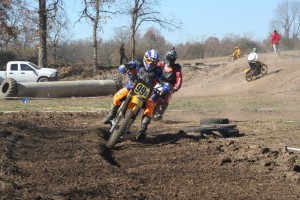
Tag Archives: motorcycles
Hope is like cornering: lean in a little and let go. Otherwise you interfere with the flow of things.
Racing has taught me a lot. If you train your eyes on some nasty cross-rut or rock in your line, that’s exactly where your body takes you and the bike. Next thing you know, you’re down and picking up parts.
But if you focus instead on where you want to go, your body takes you and the bike there. Somebody once told me about a guy on a motorcycle at a crossroads in the Branson area. The biker decided to shoot between oncoming vehicles. Unfortunately, traffic was too fast and a car clipped the motorcyclist.
Here’s the telling piece. When you looked at skid marks left by the car, the dark lines curved right into the biker! The car driver did exactly what most of us would have done: set his eyes on the darting motorcycle. But, had the driver of the car looked instead at where he wanted to go (straight ahead) he would likely have missed the biker. Where we focus is where we go.
Biking has also taught me about hope, and it’s a lot like cornering. To corner, it’s best to simply shift your weight into the corner and then let nature takes its course. Relatively effortless, actually. But it’s easy to overthink and oversteer. The result: you get off course.
Life’s like that. Hope seems to serve us best when we gently point our hearts in the direction of what we want, and then let go. After that initial setting of direction, if we overthink it, or focus too much on getting what we originally hoped for, our actions get skewed and the natural course of things can no longer flow.
In this way, hope seems to engender a little trust.
“Hope is like a path on the hillside. Once there was no path, but as villagers traveled that place, a way appeared.” Those beautiful words by Lin Yutang were written well before our current understanding of neuropaths and neuroreceptors. And yet they perfectly describe what happens in the brain and on the surface of the cells, as we open ourselves more and more to hope, or any emotion. Here’s how it works.
Endorsed by two New York Times bestselling authors.”

